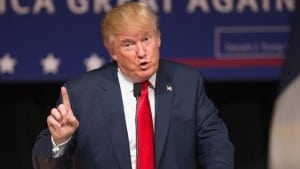
Donald Trump loves fossil energy and hates regulations. That was the message at the core of the Republican presidential candidate’s energy policy speech Thursday in Bismarck, N.D.
The billionaire real estate mogul’s energy plan centers on a desire to make the United States completely energy independent. Trump noted several times that the U.S. has vast reserves of oil and gas currently off limits due to federal moratoriums on drilling and mining and executive actions forcing a shift away from fossil energy. “President Obama has done everything he can to keep us dependent, and this is so important, on others. He wants us to be dependent on others,” Trump said.
The U.S. is currently a net exporter of coal and during the Obama Administration, for the first time since the mid-1990s, the nation began producing more oil domestically than it imports.
Trump laid out a number of measures he would implement in his effort to create an “America first” energy policy. He would declare American energy dominance a strategic economic and foreign policy goal for the nation and would “scrap” any regulation deemed “outdated, unnecessary, bad for workers or contrary to the national interests.”
“Scrapping” regulations once they have become law is not an easy task. To do so requires that an entirely new rulemaking process be completed. Among the regulations in Trump’s crosshairs are the Environmental Protection Agency’s greenhouse gas regulations and the Waters of the United States Rule. Trump also said he would abolish President Barack Obama’s Climate Action Plan.
Trump would also lift moratoriums on energy production in federal areas, including drilling moratoriums in Alaska and presumably the current moratorium on new coal leasing.
The Paris climate change agreement, which was adopted by nearly 200 countries and is hailed internationally as a massive success of global diplomacy, is also on Trumps chopping block. Trump said Thursday that he would “cancel” the agreement, which establishes a framework under which nations pursue domestically determined climate action measures.
Trump said that under the agreement, which does not contain any legally binding emissions reductions targets or timetables, “foreign bureaucrats are going to be controlling what we’re using and what we’re doing on our land in our country.”
Last week, Trump said he would “renegotiate” the agreement. The feasibility of this plan was called into question immediately as the agreement may already be in force when the next administration takes office, and the text establishes a four-year waiting period for any nation to back out once the agreement is in force.
In Bismarck, Trump also said he would “get the bureaucracy out of the way of innovation so that we can pursue all forms of energy. This includes renewable energies and the technologies of the future. It does include nuclear and wind and solar, but not to the exclusion of other forms of energy and other forms of energy that right now are working much better,” he said, later claiming that he would “save the coal industry.”
Coal’s share of the energy mix the U.S. has dropped in the last several years, due in part to the low cost of natural gas resulting from the shale revolution. During a press conference prior to his keynote address, Trump acknowledged these market forces. “The market forces are going to be whatever they are, all I can do is free up the coal, which I’m going to totally do, get the companies back to work. Market forces, that’s something I don’t want to get involved in … to me a market force is a beautiful force,” he said.
While he spent much of his speech criticizing President Barack Obama’s energy policy, Trump also took a few jabs at presumed Democratic presidential candidate Hillary Clinton. “She’ll unleash the EPA to control every aspect of our lives and every aspect of energy,” he said.